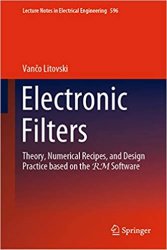Electronic Filters: Theory, Numerical Recipes, and Design Practice based on the RM Software
- Добавил: alexcat
- Дата: 5-11-2020, 21:51
- Комментариев: 0

Название: Electronic Filters: Theory, Numerical Recipes, and Design Practice based on the RM Software
Автор: Vanco Litovski
Издательство: Springer
Год: 2019
Формат: PDF
Страниц: 438
Размер: 19.91 МБ
Язык: English
This book provides a comprehensive overview of signal filtering, including an introduction, definitions of the terms and algorithms for numerical calculation of the properties of the transfer function in frequency and time domains. All the chapters discuss the theoretical background and explain the underlying algorithms including the iterative numerical procedures necessary to obtain the solutions.
It starts by considering polynomial filters, offering a broad range of solutions and introducing critical monotonic passband amplitude characteristics (CMAC). It also describes modifications to the classical Chebyshev and elliptic filters to overcome their limitations. In the context linear phase low-pass prototypes, it presents filters approximating constant group delay in the equi-ripple manner for the first time. Further, it discusses new procedures to improve the selectivity of all polynomial filters by introducing transmission zeros, such as filters with multiple transmission zeros on the omega axis, as well as phase correction of selective filters for both low-pass and band-pass filters. Other topics explored include linear phase all-pass (exhibiting low-pass group delay approximation) filters; all-pass filters (exhibiting band-pass group delay approximation) with linear and parabolic phase synthesized directly as band-pass; high-pass, and band-stop amplitude characteristic frequency transformations to produce band-pass; and direct synthesis of linear and parabolic phase selective band-pass filters synthesized directly as band-pass. Lastly, for system (physical) synthesis, the book describes the algorithms and procedures for the following: cascade passive LC; active cascade RC; active parallel RC (for the first time); active parallel SC; Gm-C based on LC prototypes; and parallel IIR based on bilinear transformation of analog prototypes.
Every algorithm, be it in transfer function synthesis or in system synthesis, is accompanied by a proper nontrivial comprehensive example produced by the RM software.
[related-news] [/related-news]
Внимание
Уважаемый посетитель, Вы зашли на сайт как незарегистрированный пользователь.
Мы рекомендуем Вам зарегистрироваться либо войти на сайт под своим именем.
Уважаемый посетитель, Вы зашли на сайт как незарегистрированный пользователь.
Мы рекомендуем Вам зарегистрироваться либо войти на сайт под своим именем.
